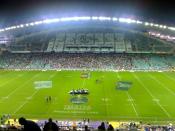I. Introduction
This paper examines the role played by the governing bodies of various sports codes in regulating the institutional arrangements of their respective sports. Institutional arrangements in sport include salary caps, player drafts, geographic resident requirements and restrictions on the number of foreign nationals allowed to play. These measures are carried out to preserve the 'competitive balance' of the competition and to safeguard opportunities for local players. An exciting and closely contested competition is an essential feature of a professional sporting league (Hadley, Ciecka, Krautmann, 2005). Creating and maintaining the competitive balance of any sporting league is vital for the credibility of the competition. When a competition is dominated by one or two teams match attendance is likely to stagnate (Fort & Maxcy, 2003). This is a result of the fact that sports fans like to see their team win, however they also like a close competition. In the United States the issue of institutional arrangements is rife as many sporting leagues face the prospect of supporters becoming disenchanted with their sport due to a lack of competitive balance (Witting, 2003).
In Australia, two sporting leagues the National Rugby League (NRL) and Australian Football League (AFL) have implemented various labour market restrictions based on the understanding they improve competitive balance. This paper explores the nature of the institutional arrangements in both these sporting leagues and their effectiveness. The focus then shifts to the issue that institutional arrangements act as a restraint on trade. A graphical representation demonstrates that professional team sports have developed a series of monopsonistic labour market rules that have severely limited the economic rights and income earning potential of players. Finally, most players and supporters reinforce (at least in a passive manner) the view that sport governing bodies should put into effect some sort of institutional...


